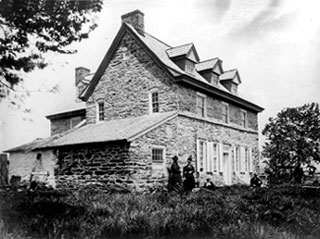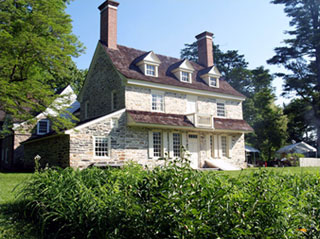As
is the case with most towns in Pennsylvania, the area of what is now
Bryn Mawr was a part of the land charter given to William Penn by King
Charles II in 1681. In 1683, fellow Quaker Rowland Ellis purchased 800
acres from Penn in an area just north of the town. Ellis surveyed the
land and built a two story stone mansion, which still stands today.
After putting his affairs in order back in England, Ellis returned
permanently to the area and named his farm Bryn Mawr, (which means
great hill in Welsh) after the name of his farm back in Merionethshire
Wales.

Harriton House 1890 |

Harriton House 1969 |
In 1719, Ellis and his family could no longer afford the farm and sold
718 acres to Maryland tobacco planter Richard Harrison and Harrison
renamed the farm "Harriton".
Many of those early Welsh settlers were family members. Rowland Ellis'
uncle, John Humphrey, had an adjoining tract of land that included the
ground that is now Bryn Mawr College and the Baldwin School. John
Humphrey died childless and his brother Benjamin inherited his 212
acres. In the ensuing years, Benjamin Humphrey inherited another large
land grant in the area from another relative. At the time of his death
in 1737, he was living in a house on the grounds of what is now Bryn
Mawr College. The Humphrey family thrived in the area and the
descendants of Benjamin branched out, built homes and businesses, and
by 1858, the little town of Humphreyville was a thriving suburban town,
nine miles west of the city of Philadelphia. The town consisted of
twenty-one houses and a two-story public school house. Additionally,
quite a few larger private estates dotted the land close to the town.
In 1832, the Philadelphia & Columbia Railway constructed its
"Main Line" between Philadelphia and Lancaster, Pennsylvania. In 1857,
the Pennsylvania Railroad Corporation purchased the "Main Line" and all
the land that bounded the tracks. Lancaster Pike and Montgomery Avenue
as they are today, were the two most important thoroughfares in
Humphreyville and these roads framed the lands owned by the "Main
Line". In 1869, Joseph Lesley, secretary of the Pennsylvania Railroad,
chose new names for the stations along the "Main Line" railway. Instead
of Humphreyville, Lesley opted the name of Rowland Ellis' homestead:
Bryn Mawr.
By the end of the 19th century, there were approximately 300 homes
within a one-mile radius of the Bryn Mawr railroad station making it
one of the most populated areas in Lower Merion Township. As prominent
Philadelphians began to live permanently in Bryn Mawr rather than
simply summering in the area, the demand for the finest schools for
their children, health care for their well-being and merchants for
their goods increased and Bryn Mawr became a focal point of the now
prestigious Main Line community.
Today, Bryn Mawr continues to be the center point of the prominent
Pennsylvania Main Line. Come to Bryn Mawr and support the local
businesses, restaurants and other first class amenities that make this
area such a wonderful place to shop, learn, work, and live.